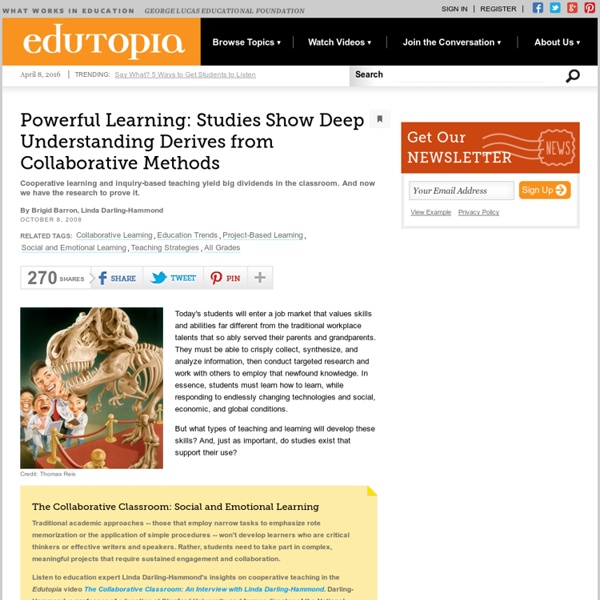Powerful Learning: Studies Show Deep Understanding Derives from Collaborative Methods

Fostering a Culture of Inquiry
How can we apply literary elements and work with local experts to create high-quality graphic novels? How do cycles of revision improve our artwork? How might we impact voter turnout for a local municipal election? How do we deep our students' mathematical thinking? Now in its 13th year, the Calgary Science School has had a consistent focus on problem-based and inquiry-based teaching and learning. Inquiry also infuses the school's approach to professional development. "The name 'Calgary Science School' can be a bit misleading," Stephenson says. How does Calgary Science School define inquiry-based learning? Adding Value with Outreach As a Canadian charter school, Calgary Science School has a dual mission. One method of outreach is the school blog. Internally, the blog provides an institutional memory and project archive. In another outreach effort, Calgary Science School invites collaboration with other schools. U.S. Please share your thoughts in the comments.
Introduction to Inquiry Based Learning
At the Calgary Science School we focus on inquiry-based learning, technology-intergration and outdoor/environmental education. We believe these three pillars come together to provide students with opportunities for authentic, meaningful and relevant learning. At the core of our program is inquiry - an approach to learning and teaching (including teacher learning) that is the foundation of all we do. Our thinking around inquiry is that it is more than just 'doing projects' but is rather nurturing a dispostion toward critical thinking, reflection and idea improvement in all learners in our building. In creating and sharing these projects, we are thankful to the Galileo Educational Network for their role in shaping much of our thinking about inquiry. On this blog you'll find a growing collection of inquiry-based projects. This document is currently in a text-only format and our next goal is to embed illustrative video throughout the document.
What Is Inquiry?
Read Article in Spanish Inquiry is a dynamic process of being open to wonder and puzzlement and coming to know and understand the world. As such, it is a stance that pervades all aspects of life and is essential to the way in which knowledge is created. Inquiry is based on the belief that understanding is constructed in the process of people working and conversing together as they pose and solve the problems, make discoveries and rigorously testing the discoveries that arise in the course of shared activity. Misconception Alert “Inquiry is not a “method” of doing science, history, or any other subject, in which the obligatory first stage in a fixed, linear sequence is that of students each formulating questions to investigate. Inquiry is a study into a worthy question, issue, problem or idea. There are several dimensions of inquiry: These are taken from the Inquiry Rubric Reference (1) Wells, Gordon (2001).
Related:
Related:



